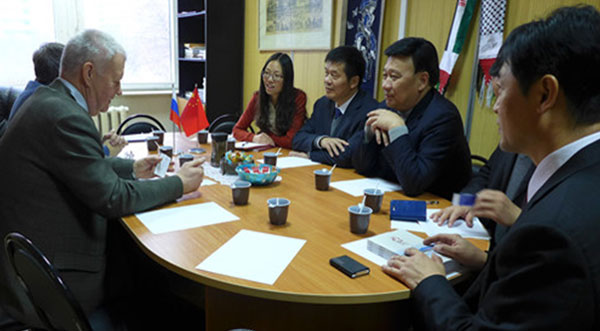 |
|
Secretary of the Party Committee, Wang Zuoqiao discussing with officials from Association of Russian Universities how to carry out intercollegiate cooperation under the "One Belt and One Road" framework. [Photo provided to chinadaily.com.cn] |
According to the cooperative arrangement, the center will be jointly established by HUCM and the Institute of Oriental Medicine of Malaysia in the first stage.
Based on this center, a few TCM medical departments will be founded under the leadership of KJP Healthcare, offering TCM medical and life nurturing services for the locals.
In the long run, HUCM and the Malaysian Ministry of Health will launch TCM academic certificate education and continuing education such as medical training of TCM when conditions are mature.
As Chen says, under the new strategy, establishment of the center will help popularize and spread Chinese medical culture, and the resulting collaborative projects will definitely execute a far-reaching influence on TCM to go global, and promote international exchange and cooperation between HUCM and concerned academic organizations in foreign countries, especially the ASEAN countries.
Meticulous Planning Ever since president Xi Jinping put forward the "One Belt, One Road" initiatives in 2013, leaders of HUCM have responded to it positively. In December, Wang Zuoqiao, Secretary of the Party Committee of HUCM, during a visit to Russia with the Hubei Delegation of Higher Education, had extensively discussed educational and academic cooperation with the Pushkin State Russian Language Institute and Saratov State Medical University under the framework of "One Belt, One Road" initiatives.
On March 26th, at the fifth Teachers' Congress, Wang Hua, president of HUCM, explicitly put forward in his annual Work Report that HUCM would participate in "One Belt, One Road" initiatives and seize the golden opportunity for the school’s long-term development. Wang said that the university should expand collaborative areas with foreign universities and academic organizations under the strategy and steadily improve the intercollegiate cooperation to a new level. According to his report, in 2015 HUCM would improve its academic communication with the concerned universities especially those in Thailand, Britain, and Australia and strive for new cooperative programs in education.
He also declared that HUCM would help to establish the Confucius Institute in Canada, which will be the first Confucius Institute co-founded by HUCM and a foreign university.